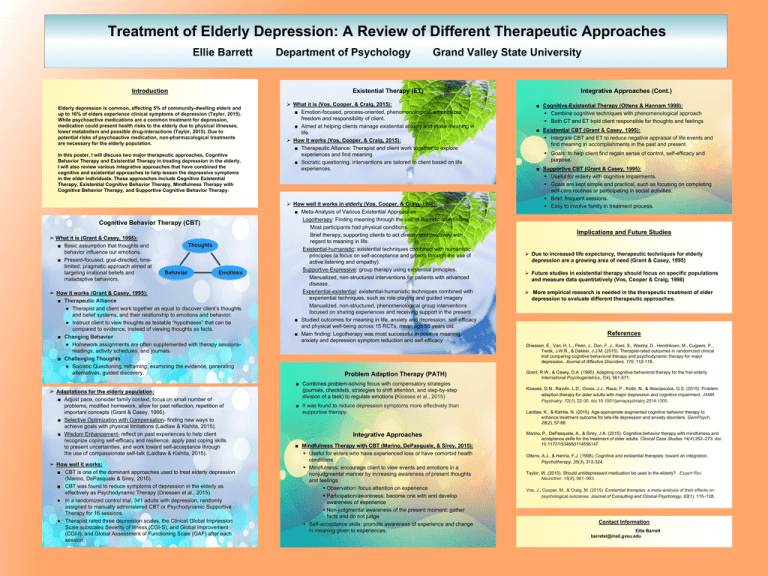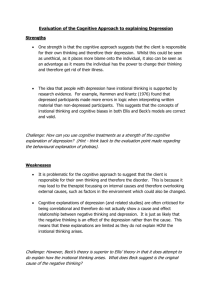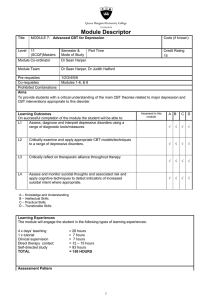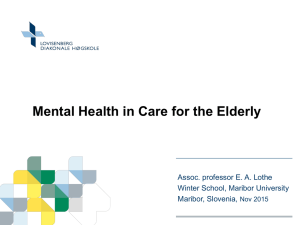Treatment of Elderly Depression: A Review of Different Therapeutic Approaches
advertisement

Treatment of Elderly Depression: A Review of Different Therapeutic Approaches Ellie Barrett Elderly depression is common, affecting 5% of community-dwelling elders and up to 16% of elders experience clinical symptoms of depression (Taylor, 2015). While psychoactive medications are a common treatment for depression, medication could present health risks to the elderly due to physical illnesses, lower metabolism and possible drug-interactions (Taylor, 2015). Due to potential risks of psychoactive medication, non-pharmacological treatments are necessary for the elderly population. In this poster, I will discuss two major therapeutic approaches, Cognitive Behavior Therapy and Existential Therapy in treating depression in the elderly. I will also review various integrative approaches that have combined the cognitive and existential approaches to help lessen the depressive symptoms in the older individuals. These approaches include Cognitive Existential Therapy, Existential Cognitive Behavior Therapy, Mindfulness Therapy with Cognitive Behavior Therapy, and Supportive Cognitive Behavior Therapy. Cognitive Behavior Therapy (CBT) Thoughts Behavior Grand Valley State University Existential Therapy (ET) Introduction ➢ What it is (Grant & Casey, 1995): ■ Basic assumption that thoughts and behavior influence our emotions. ■ Present-focused, goal-directed, timelimited, pragmatic approach aimed at targeting irrational beliefs and maladaptive behaviors. Department of Psychology Emotions ➢ How it works (Grant & Casey, 1995): ■ Therapeutic Alliance ● Therapist and client work together as equal to discover client’s thoughts and belief systems, and their relationship to emotions and behavior. ● Instruct client to view thoughts as testable “hypotheses” that can be compared to evidence, instead of viewing thoughts as facts. ■ Changing Behavior ● Homework assignments are often supplemented with therapy sessionsreadings, activity schedules, and journals. ■ Challenging Thoughts ● Socratic Questioning, reframing, examining the evidence, generating alternatives, guided discovery. ➢ Adaptations for the elderly population: ■ Adjust pace, consider family context, focus on small number of problems, modified homework, allow for past reflection, repetition of important concepts (Grant & Casey, 1995). ■ Selective Optimization with Compensation- finding new ways to achieve goals with physical limitations (Laidlaw & Kishita, 2015). ■ Wisdom Enhancement- reflect on past experiences to help client recognize coping self-efficacy and resilience, apply past coping skills to present uncertainties, and work toward self-acceptance through the use of compassionate self-talk (Laidlaw & Kishita, 2015). ➢ How well it works: ■ CBT is one of the dominant approaches used to treat elderly depression (Marino, DePasquale & Sirey, 2015). ■ CBT was found to reduce symptoms of depression in the elderly as effectively as Psychodynamic Therapy (Driessen et al., 2015). ● In a randomized control trial, 341 adults with depression, randomly assigned to manually administered CBT or Psychodynamic Supportive Therapy for 16 sessions. ● Therapist rated three depression scales, the Clinical Global Impression Scale subscales Severity of Illness (CGI-S), and Global Improvement (CGI-I), and Global Assessment of Functioning Scale (GAF) after each session. What it is (Vos, Cooper, & Craig, 2015): ■ Emotion-focused, process-oriented, phenomenological, emphasizes freedom and responsibility of client. ■ Aimed at helping clients manage existential anxiety and make meaning in life. How it works (Vos, Cooper, & Craig, 2015): ■ Therapeutic Alliance: Therapist and client work together to explore experiences and find meaning. ■ Socratic questioning, interventions are tailored to client based on life experiences. How well it works in elderly (Vos, Cooper, & Craig, 1998): ■ Meta-Analysis of Various Existential Approaches Logotherapy: Finding meaning through the use of Socratic questioning Most participants had physical conditions. Brief therapy, supporting clients to act directly and positively with regard to meaning in life. Existential-humanistic: existential techniques combined with humanistic principles (a focus on self-acceptance and growth through the use of active listening and empathy). Supportive-Expressive: group therapy using existential principles. Manualized, non-structured interventions for patients with advanced disease. Experiential-existential: existential-humanistic techniques combined with experiential techniques, such as role-playing and guided imagery Manualized, non-structured, phenomenological group interventions focused on sharing experiences and receiving support in the present ■ Studied outcomes for meaning in life, anxiety and depression, self-efficacy and physical well-being across 15 RCTs, mean age 50 years old. ■ Main finding: Logotherapy was most successful in positive meaning, anxiety and depression symptom reduction and self-efficacy Integrative Approaches (Cont.) ■ Cognitive-Existential Therapy (Ottens & Hannam 1998): Combine cognitive techniques with phenomenological approach Both CT and ET hold client responsible for thoughts and feelings ■ Existential CBT (Grant & Casey, 1995): Integrate CBT and ET to reduce negative appraisal of life events and find meaning in accomplishments in the past and present. Goals: to help client find regain sense of control, self-efficacy and purpose. ■ Supportive CBT (Grant & Casey, 1995): Useful for elderly with cognitive impairments. Goals are kept simple and practical, such as focusing on completing self-care routines or participating in social activities. Brief, frequent sessions. Easy to involve family in treatment process. Implications and Future Studies Due to increased life expectancy, therapeutic techniques for elderly depression are a growing area of need (Grant & Casey, 1995) Future studies in existential therapy should focus on specific populations and measure data quantitatively (Vos, Cooper & Craig, 1998) More empirical research is needed in the therapeutic treatment of elder depression to evaluate different therapeutic approaches. References Driessen, E., Van, H. L., Peen, J., Don, F. J., Kool, S., Westra, D., Hendriksen, M., Cuijpers, P., Twisk, J.W.R., & Dekker, J.J.M. (2015). Therapist-rated outcomes in randomized clinical trial comparing cognitive behavioral therapy and psychodynamic therapy for major depression. Journal of Affective Disorders, 170, 112-118. Problem Adaption Therapy (PATH) ■ Combines problem-solving focus with compensatory strategies (journals, checklists, strategies to shift attention, and step-by-step division of a task) to regulate emotions (Kiosses et al., 2015) ■ It was found to reduce depression symptoms more effectively than supportive therapy. Integrative Approaches ■ Mindfulness Therapy with CBT (Marino, DePasquale, & Sirey, 2015): Useful for elders who have experienced loss or have comorbid health conditions Mindfulness: encourage client to view events and emotions in a nonjudgmental manner by increasing awareness of present thoughts and feelings Observation: focus attention on experience Participation/awareness: become one with and develop awareness of experience Non-judgmental awareness of the present moment: gather facts and do not judge Self-acceptance skills: promote awareness of experience and change in meaning given to experiences. Grant, R.W., & Casey, D.A. (1995). Adapting cognitive behavioral therapy for the frail elderly. International Psychogeriatrics, 7(4), 561-571. Kiosses, D.N., Ravdin, L.D., Gross, J.J., Raue, P., Kotbi, N., & Alexopoulos, G.S. (2015). Problem adaption therapy for older adults with major depression and cognitive impairment. JAMA Psychiatry, 72(1), 22-30. doi:10.1001/jamapsychiatry.2014.1305 Laidlaw, K., & Kishita, N. (2015). Age-appropriate augmented cognitive behavior therapy to enhance treatment outcome for late-life depression and anxiety disorders. GeroPsych, 28(2), 57-66. Marino, P., DePasquale, A., & Sirey, J.A. (2015). Cognitive behavior therapy with mindfulness and acceptance skills for the treatment of older adults. Clinical Case Studies 14(4) 262–273. doi: 10.1177/1534650114556147 Ottens, A.J., & Hanna, F.J. (1998). Cognitive and existential therapies: toward an integration. Psychotherapy, 35(3), 312-324. Taylor, W. (2015). Should antidepressant medication be used in the elderly? Expert Rev. Neurother. 15(9), 961–963. Vos, J., Cooper, M., & Craig, M. (2015). Existential therapies: a meta-analysis of their effects on psychological outcomes. Journal of Consulting and Clinical Psychology, 83(1), 115–128. Contact Information Ellie Barrett barretel@mail.gvsu.edu




